Leading Educators at the UCSF School of Medicine Propose Solutions to Improve Core Clerkship Performance Assessments

Bridges Student Dashboard
Traditionally, medical school training has emphasized high-stakes exams and summary core clerkship evaluations that prioritize medical knowledge over other competencies and provide variable feedback to students. The core clerkship grading process causes stress for students and can interfere with their learning. Core clerkship students need and deserve more detailed insight about their individual performance on the career path toward residency in order to develop into well-rounded physicians.
To help address these challenges, UCSF School of Medicine leadership and faculty educators are aiming to design a model of assessment that ensures every graduate is prepared with competencies needed to transition into the next phase of education, where they will be expected to provide patient care and engage in learning with less direct supervision.
“Students and faculty alike succumb to the illusion of objectivity—that quantitative ratings converted to grades convey accurate measures of the complexity of clinical performance,” says Karen Hauer, MD, PhD, Associate Dean, Competency Assessment and Professional Standards at the UCSF School of Medicine, and lead author of a commentary on core clerkship grading published online today in Academic Medicine.
